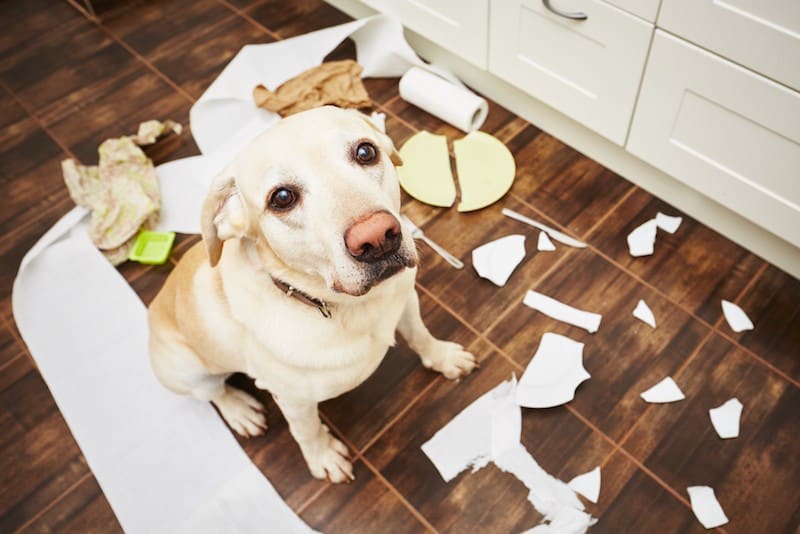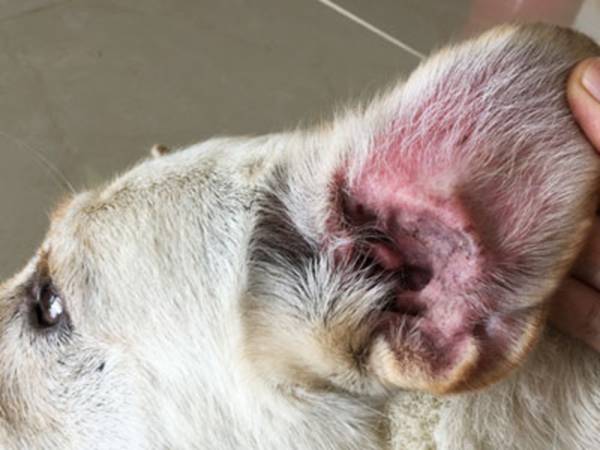The contents of the OurFitPets.com website, such as text, graphics, images, and other material contained on this site (“Content”) are for informational purposes only. The Content is not intended to be a substitute for professional veterinarian advice, diagnosis, or treatment. Always seek the advice of your veterinarian with any questions you may have regarding the medical condition of your pet. Never disregard professional advice or delay in seeking it because of something you have read on this website!
Some of the links in this post are affiliate links. This means if you click on the link and purchase this item or service, we will receive an affiliate commission at no extra cost to you. All opinions remain our own.
Anxiety is an illness commonly attributed to humans. But a survey of dog behaviors in Finland found that over 72 percent of the canine subjects exhibited symptoms similar to those displayed by humans with anxiety, according to Medical News Today. It seems we have more in common with our species’ best friends than we previously realized. In light of that, we need to reevaluate how we address our dogs’ distress. All of the bad decisions pet owners make when raising dogs stems from neglect. In order to ensure our dogs’ mental well-being, we need to start treating them with care, attention, and love.
Try some touch therapy
Just like with humans, touch therapy is incredibly effective in reducing stress and anxiety in dogs. A reassuring petting or hug can work wonders in terms of calming them down, especially if you think they are experiencing separation anxiety. Walking them or playing with them gives them an outlet for all of that jumpy energy that anxiety gives them.
If helping them exert all that anxious energy doesn’t work, settle your dog down somewhere and give them a massage. If you’ve ever had a good massage, you’d be familiar with how soothing and rejuvenating it can be. An anxious dog would be tense and uncomfortable. Relieve your pup’s tension by stroking them firmly all throughout the body, starting from the neck. Keep one hand free to pet them reassuringly, and watch for their reactions to your strokes. This will help you identify focal points of stress that you would need to give extra care to.
Soothe their senses
As you may well know, dogs are incredibly sensitive to sound and smell, as well as touch. If their noses scrunch up or they snort, their stress might be smell-induced. If their ears are pinned against their head or they’re covering their face, then they could be irritated by sound. It’s important to look at the signs of anxiety in dogs in order to pinpoint the cause of the problem and address it effectively.
Massage is one of the most basic things you can do to subdue dogs by appealing to their touch sensitivity. But there are other ways you can use touch as a calming tool. Treats and toys help them relieve persistent anxious chewing. Or you can wrap them in a security blanket to make them feel less fearful of their surroundings. As for sound irritation, you can retreat with them to a sound-insulated room and listen to their favorite tunes, or you can sing to them. As for smell, you can make use of essential oils or vanilla fragrance to clear out whatever unpleasant odor they’re detecting.
Consider medical treatments
Persistent stress and anxiety, no matter what you do to try to calm them, can be a sign that your dog has an underlying medical condition that a vet needs to look at. Once your dog gets their checkup, the vet will immediately prescribe a course of action and medication that will help your dog get back to normal. But while waiting for medical exam results, or if you’re holding off on seeing a vet, you can try to use pheromone products to keep your dog calm. These can be bought as fluids delivered in sprays, wipes, and diffusers, or infused into special collars. Do not use actual drugs without prescription, as you do not know how your dog will react.
Always remember that dogs are incredibly receptive to your mood. They can internalize the stress you feel and become stressed and anxious because of it. That’s why it’s important to remain calm when interacting with your pet. Try not to use treats to calm down your dog, as that would be rewarding their anxious behavior. Instead, try to desensitize them to their triggers and reward them for their progress. And above all, only use drugs as a last resort. Frequent checkups are good, but bonding with your dog is the best remedy to stress and anxiety.
(Visited 262 times, 1 visits today)
Online Veterinary 24/7
Chat With A Veterinarian Online
Connect with a verified veterinarian in minutes. Licensed vets are available 24/7 to answer your questions. No need to worry about your furry family member.

Tom
Tom has always loved to write since he was little - he wanted to be either a writer or a veterinary doctor, but he ended up being a professional writer while most of his works are based on animals. He was born in San Francisco but later moved to Texas to continue his job as a writer. He graduated from the University of San Francisco where he studied biotechnology. He is happily married and a soon to be father!
Chat With a Veterinarian For Personalized Help
Review symptoms, medications & behavior to keep your pets healthy with a Vet Online in just minutes.
Ask a Vet Live Now



